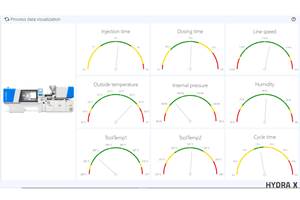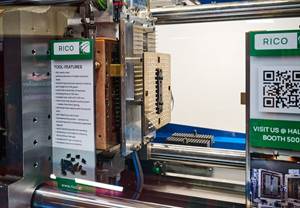NPE Diary Vol. 3: Industry 4.0 and the End of Waste
So much of what's on display at NPE2018 doesn't seem to be about producing more; it's about wasting less.
Yesterday I mentioned that I only listened to a presentation about Industry 4.0 because after about three minutes, my brain exploded. Today I set out to double, maybe even triple, the amount of time I could hear about Industry 4.0 before it inevitably surpassed my understanding.
When I think of Industry 4.0 (which, admittedly, is not very often, but anyway) I think of dongles and indicators on pieces of machinery. Little wifi-enabled nano bugs that transmit data about a piece or part back to one centralized location where that info can be compiled, analyzed and understood so that people can make better production decisions. Robots working in concert with humans. The fourth industrial revolution, and so on and so forth.
What I don’t think of is waste. But today, as I meandered around the South Hall I began to realize that’s pretty much all Industry 4.0 is about—ending waste, or turning something that might’ve become waste, and making it an asset.
I’m not necessarily talking about material waste. I’m thinking more about wastes of time or wastes of energy or wastes of brainpower. In the BASF booth in the South Hall I saw a robot sort of…waving to me. I came over to say hello and met a friend of mine who was working in the booth (note: no, she is not a robot).
In the BASF booth there’s a sign about Industry 4.0 and I was sort of surprised because I didn’t see how materials figured into what, until today, had seemed to me to be a much more machinery, IT-related development. My friend was kind enough to enlighten me to the fact that all those robots and indicators—all the things that report back to that centralized system I mentioned earlier—have to be made of something. It has to be durable and it has to be lightweight and companies like BASF enable those things to happen.
BASF didn’t manufacture the robot in their booth (the one that was waving), as my friend told me, but they made it better. Because of BASF’s materials, it’s lighter so it wastes less energy, and it doesn’t break or malfunction as often so it wastes less time. A lot of Industry 4.0 robots can make some small decisions themselves, so they don’t waste valuable human brainpower making minor choices. And so on and so forth.
After I left the BASF booth, elsewhere in the South Hall I watched a guy grab a box of collected scrap plastic material that had been discarded by the injection molding machine pumping out orange plastic bottles in his booth. He took the box full of scrap material away so it could be reprocessed and then put to good use later.
Swap out “scrap plastic material” with scrap time, scrap energy and scrap human brainpower, and this guy was doing the work of Industry 4.0 right there in his booth. From those seemingly tiny, simply tasks happening every day on the floor to the loftiest, most advanced technologies, the goal of everyone here seems to be working toward is the end of waste—every kind of it.
Anyway, more adventures to come tomorrow!
~J.
Related Content
The Future of Automation in Injection Molding
Are you automating enough? At #PTXPO23 we spoke with leaders in automation and injection molding about the current state of automation and what’s in store for the future.
Read MoreWhat to Look for in High-Speed Automation for Pipette Production
Automation is a must-have for molders of pipettes. Make sure your supplier provides assurances of throughput and output, manpower utilization, floor space consumption and payback period.
Read MoreManufacturers’ Superpower: ‘X-Ray Vision’ into Your Processes
Meet a ‘new’ name (to North American processors) in MES software, which provides a simple, modular way to achieve visibility into your production operations.
Read MoreLSR Advances in Dispensing, Tooling and Automation
At Fakuma 2023, Sumitomo (SHI) Demag’s LSR injection molding machines showcased advances from itself and partners Reinhardt-Technik, Rico and Sepro.
Read MoreRead Next
See Recyclers Close the Loop on Trade Show Production Scrap at NPE2024
A collaboration between show organizer PLASTICS, recycler CPR and size reduction experts WEIMA and Conair recovered and recycled all production scrap at NPE2024.
Read MoreLead the Conversation, Change the Conversation
Coverage of single-use plastics can be both misleading and demoralizing. Here are 10 tips for changing the perception of the plastics industry at your company and in your community.
Read MoreBeyond Prototypes: 8 Ways the Plastics Industry Is Using 3D Printing
Plastics processors are finding applications for 3D printing around the plant and across the supply chain. Here are 8 examples to look for at NPE2024.
Read More




















